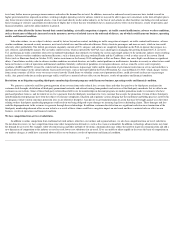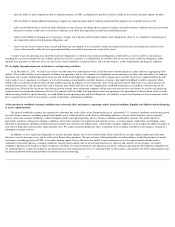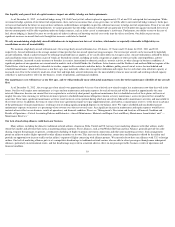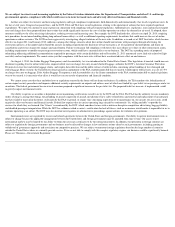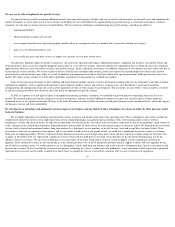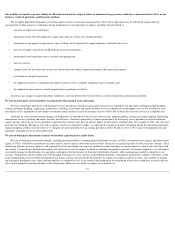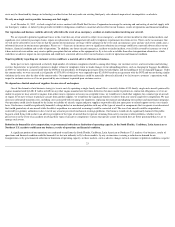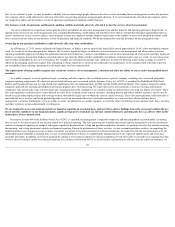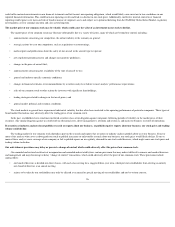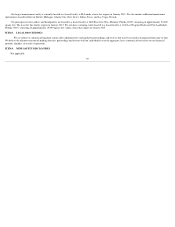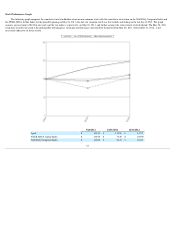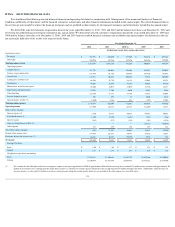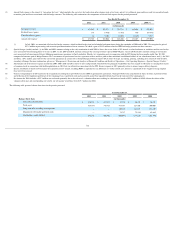Spirit Airlines 2012 Annual Report Download - page 25
Download and view the complete annual report
Please find page 25 of the 2012 Spirit Airlines annual report below. You can navigate through the pages in the report by either clicking on the pages listed below, or by using the keyword search tool below to find specific information within the annual report.
public perception of these destinations, unfavorable weather conditions, or terrorist related activities. Furthermore, our business could be harmed if jurisdictions that
currently limit competition allow additional airlines to compete on routes we serve. Many of the countries we serve are experiencing either economic slowdowns or
recessions, which may translate into a weakening of demand and could harm our business, results of operations and financial condition.
Increases in insurance costs or significant reductions in coverage could have a material adverse effect on our business, financial condition and results of
operations.
We carry insurance for public liability, passenger liability, property damage and all-risk coverage for damage to our aircraft. As a result of the September 11, 2001
terrorist attacks, aviation insurers significantly reduced the amount of insurance coverage available to commercial air carriers for liability to persons other than employees or
passengers for claims resulting from acts of terrorism, war or similar events (war risk insurance). Accordingly, our insurance costs increased significantly and our ability to
continue to obtain certain types of insurance remains uncertain. While the price of commercial insurance has declined since the period immediately after the terrorist attacks,
in the event commercial insurance carriers further reduce the amount of insurance coverage available to us, or significantly increase its cost, we would be adversely affected.
We currently maintain commercial airline insurance with several underwriters. However, there can be no assurance that the amount of such coverage will not be changed, or
that we will not bear substantial losses from accidents. We could incur substantial claims resulting from an accident in excess of related insurance coverage that could have a
material adverse effect on our results of operations and financial condition.
We have obtained third-
party war risk insurance, which insures against some risks of terrorism, through a special program administered by the FAA, resulting in lower
premiums than if we had obtained this insurance in the commercial insurance market. If the special program administered by the FAA is not continued, or if the government
discontinues this coverage for any reason, obtaining comparable coverage from commercial underwriters could result in substantially higher premiums and more restrictive
terms, if it is available at all. Our business, results of operations and financial condition could be materially adversely affected if we are unable to obtain adequate war risk
insurance. The FAA war risk hull and liability insurance policy is effective from October 1, 2012 through September 30, 2013 .
Failure to comply with applicable environmental regulations could have a material adverse effect on our business, results of operations and financial condition.
We are subject to increasingly stringent federal, state, local and foreign laws, regulations and ordinances relating to the protection of the environment, including those
relating to emissions to the air, discharges to surface and subsurface waters, safe drinking water, and the management of hazardous substances, oils and waste materials.
Compliance with all environmental laws and regulations can require significant expenditures and any future regulatory developments in the United States and abroad could
adversely affect operations and increase operating costs in the airline industry. For example, climate change legislation was previously introduced in Congress and such
legislation could be re-introduced in the future by Congress and state legislatures, and could contain provisions affecting the aviation industry, compliance with which could
result in the creation of substantial additional costs to us. Similarly, the Environmental Protection Agency issued a rule that regulates larger emitters of greenhouse gases.
Future operations and financial results may vary as a result of such regulations. Compliance with these regulations and new or existing regulations that may be applicable to
us in the future could increase our cost base and could have a material adverse effect on our business, results of operations and financial condition.
Governmental authorities in several U.S. and foreign cities are also considering or have already implemented aircraft noise reduction programs, including the
imposition of nighttime curfews and limitations on daytime take-offs and landings. We have been able to accommodate local noise restrictions imposed to date, but our
operations could be adversely affected if locally-imposed regulations become more restrictive or widespread.
If we are unable to attract and retain qualified personnel or fail to maintain our company culture, our business, results of operations and financial condition could
be harmed.
Our business is labor intensive. We require large numbers of pilots, flight attendants, maintenance technicians and other personnel. The airline industry has from time
to time experienced a shortage of qualified personnel, particularly with respect to pilots and maintenance technicians. In addition, as is common with most of our
competitors, we have faced considerable turnover of our employees. We may be required to increase wages and/or benefits in order to attract and retain qualified personnel.
If we are unable to hire, train and retain qualified employees, our business could be harmed and we may be unable to implement our growth plans.
In addition, as we hire more people and grow, we believe it may be increasingly challenging to continue to hire people who will maintain our company culture. Our
company culture, which we believe is one of our competitive strengths, is important to providing high-quality customer service and having a productive, accountable
workforce that helps keep our costs
24



